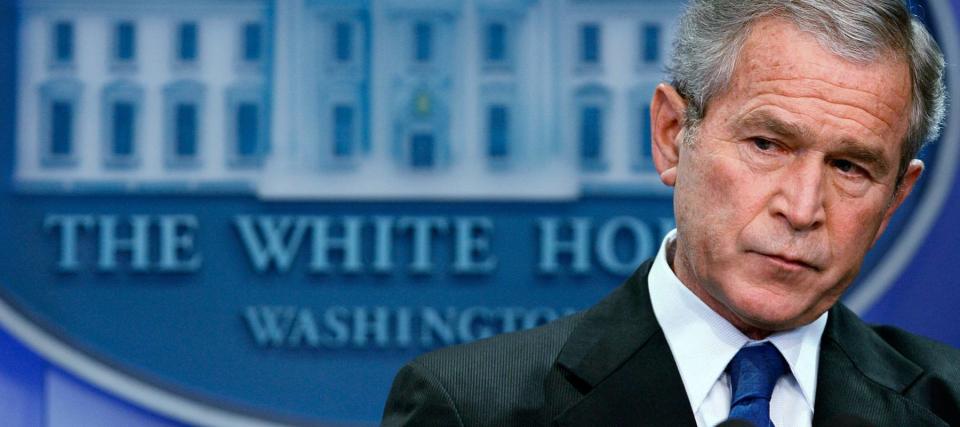George W. Bush Uttered 'the 10 Most Important Words in the History of Economics' in 2008, Warren Buffett Says
Instead of quoting a historical figure like Adam Smith, Daniel Kahneman, or John Maynard Keynes, legendary investor Warren Buffett believes the most consequential words on modern economics came from a surprising source: former U.S. President George W. Bush. At the height of the 2008 financial crisis, Bush said: “If money isn’t loosened up, this sucker could go down!”
Buffett deemed this quip “the 10 most important words in the history of economics,” he told billionaire Dan Gilbert during an interview at the Detroit Homecoming event at the College for Creative Studies in 2014. Here’s why Buffett believes these words had such a great impact on the global economy.
Reassuring the Market
Buffett believes that at the time, the global economy had hit a moment of panic when it seemed U.S. money market funds were in jeopardy. Money market funds are mutual funds that invest in highly liquid, near-term instruments such as U.S. Treasuries. They are insured by the Federal Deposit Insurance Corporation. In other words, they’re a place where people park their money for safekeeping. But when that sense of security was questioned, panic spread.
“Thirty-five million Americans at the start of September [2008] thought $3.5 trillion of their money was safe in money market funds,” Buffett said. “Then, in one week, they got worried about it.”
He believes, during this critical moment, Bush’s words were a signal to Hank Paulson, Secretary of the Treasury at the time, along with Federal Reserve chair Ben Bernanke, that all options to secure the money market were on the table. “Bernanke and Paulson could then say, ‘We’ll do whatever it takes,’” Buffett explained.
The Rescue: Quantitative Easing
What it took to rescue the economy was an unorthodox program known as quantitative easing. Effectively, Bernanke and Paulson coordinated a series of actions, including the purchasing of securities, to inject money into the financial system. This lowered borrowing costs and increased the money supply.
From 2008 to 2015, the Fed’s balance sheet surged more than fourfold, to about $4.5 trillion, according to the Federal Reserve Bank of Philadelphia. In other words, money loosened up.
Quantitative Tightening: The Reverse Phenomenon
Nowadays, however, investors seem to be witnessing this phenomenon in reverse. The biggest challenge in recent years apparently hasn’t been the lack of cash, but too much of it. Money supply in the economy boomed during the pandemic, which may have been a key reason for heightened inflation, according to Christopher J. Neely, Senior Economic Policy Advisor, Federal Reserve Bank of St. Louis.
To tame inflation, Fed chairman Jerome Powell engaged in a quantitative tightening program in June 2022. In other words, money would be tightened up in the system. Since then, the Fed’s balance sheet has declined from nearly $9 trillion to $7.2 trillion.
Raising interest rates has also been part of the quantitative tightening program. The Federal Reserve raised its benchmark interest rate from 0.25% to between 5.25% and 5.5%.
For ordinary savers, this means better returns on fixed-income products. The Vanguard Federal Money Market Fund offers an attractive yield of 5.29%, while the iShares U.S. Treasury Bond ETF offers a yield of 4.4%. For those seeking steady passive income, parking money in treasury bonds and money market funds can be fairly lucrative these days.
Conclusion
Warren Buffett’s assessment of George W. Bush’s words during the 2008 financial crisis highlights the critical role of leadership and communication in times of economic turmoil. Bush’s statement, though seemingly casual, served as a pivotal moment that influenced the course of economic policy and ultimately helped stabilize the global financial system. As we navigate through different economic phases, the lessons from these historical events remain invaluable.
